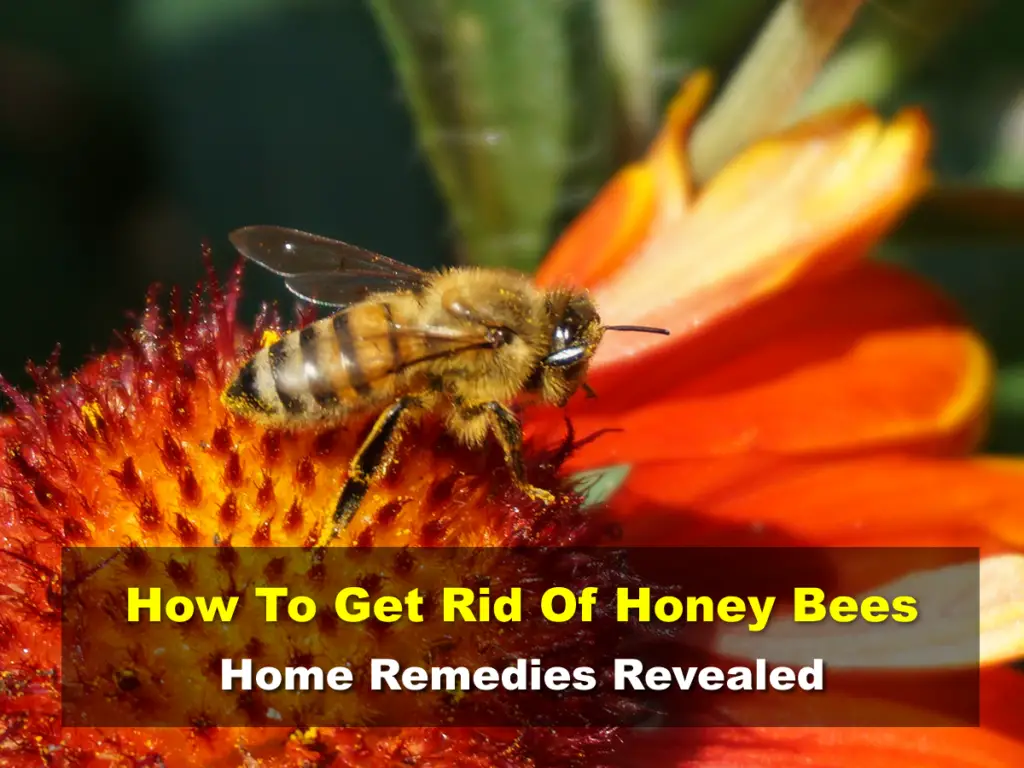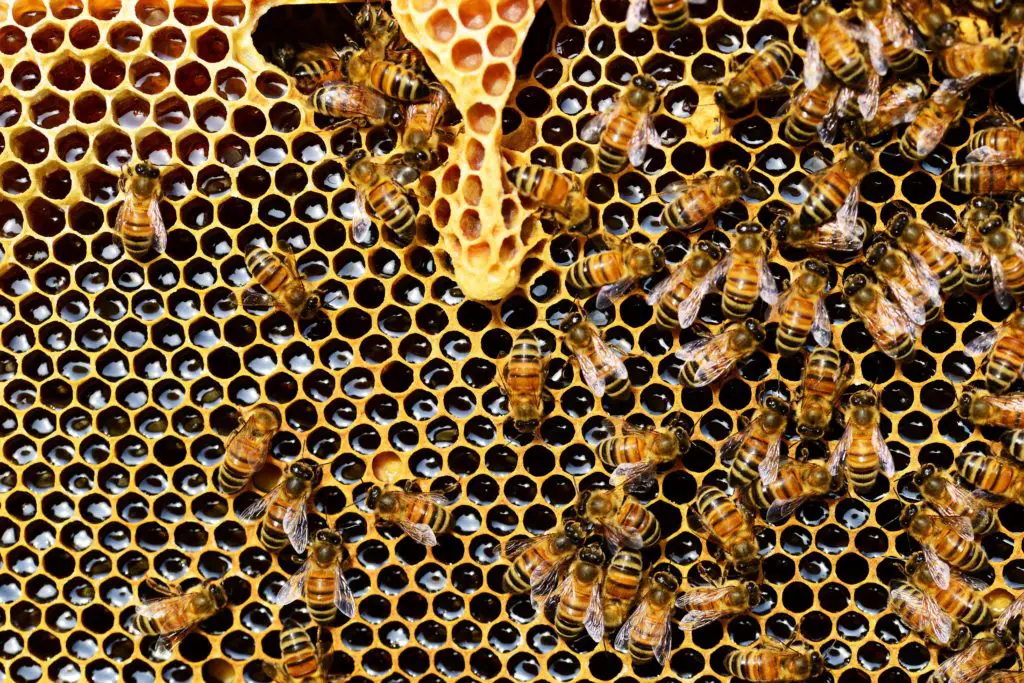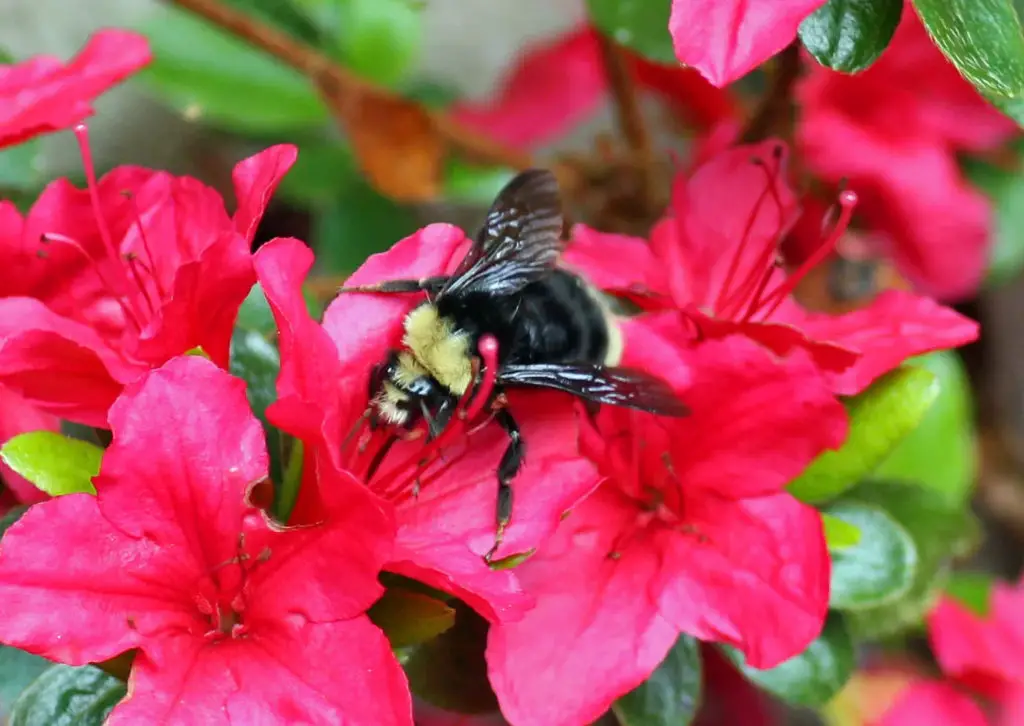Affiliate Disclaimer - As an Amazon Associate I earn from qualifying purchases.
It supports the website. So, Thank you
I love honey bees and I think they’re one of the most fascinating garden insects. But when they arrive in swathes, they can get pretty annoying and it’s only natural that you’ll want to get rid of them. So do you know how to get rid of honey bees using home remedies?
While chemical insecticides are effective, there’s no need to kill the honey bees. Instead, you can use things like mothballs, cinnamon powder, and essential oils to humanely send them packing.
If you’re currently experiencing problems with backyard bees then this article will give you a wide range of tips on how to handle the situation organically.
Table of Contents
What Attracts Honey Bees To The Garden?
Honey bees are mainly attracted to gardens that provide them with suitable nesting spots and great foraging opportunities.
In most cases, this means they’ll come to gardens that have lots of flowering plants, a water source, and things like trees where they can nest.
However, honey bees aren’t all that fussy about where they start a nest and may be attracted to sheltered areas like walls and attics.
Why Get Rid Of Honey Bees?
Having one or two bees buzzing around your backyard isn’t usually too much of a problem. They cause very little disruption and aren’t generally harmful.
But if there are lots of bees in your garden, they can become a nuisance especially when you’re trying to enjoy an al fresco meal as they may show an interest in any sugary foods.
For this reason, most homeowners are keen to get rid of honey bees and reclaim their outdoor space.
What’s more, if you know that you or any member of your family has a bee sting allergy then it’s likely that you’ll want to get rid of any associated risks by keeping honey bees out of your garden.
Are Honey Bees Dangerous?
No. Honeybees are not dangerous to humans. While the worker bees do possess a stinger, they will rarely use this.
The only time that a honey bee will sting is when it feels threatened, especially if it feels there is a direct threat to the nest. So, as long as you leave the bees alone, they’ll leave you alone too.
If you do have bees in your garden but don’t want to get rid of them, keep in mind that they’ll just visit the flowers they want to forage from and be on their way. That is unless you have a nest, in which case, I understand why most people won’t want to share their garden with thousands of bees.
That said, there are some people that have a bee sting allergy and in this case, honey bees may pose a threat.
Should You Kill Honey Bees?
I will always stand up for bees and tell anyone who asks me that killing them should always be the very last resort. While they can be pesky and annoying, honey bees are important pollinators. Without them, many crop and wildflower species would struggle to survive and this can have a knock-on effect on the entire ecosystem.
So, it is always best to choose natural remedies for getting rid of honey bees. However, if your property is plagued by stubborn honey bees then you may have no other choice but to eradicate them.
If you must do this then opt for the most human method and use a fast-acting insecticide. Moreover, you could enlist the help of a professional pest controller who will be able to deal with the honey bees in the safest and most human way.
Best Home Remedies For Getting Rid Of Honey Bees
If you’re having problems with large numbers of honey bees in your garden or you have a nest, there are lots of natural ways you can get rid of them without harming the environment or the bees.
Use An Essential Oil Spray
I think that one of the best ways to naturally get rid of bees is by using an essential oil spray. Not only will this deal with honey bees but it also works well on a variety of other insects including yellow jackets.
You’ll need a spray bottle and you can fill this with a blend of eucalyptus and cedar essential oils. This is an eco-friendly type of insecticide that won’t harm the environment or the bees. They simply do not like the smell so will take their activities elsewhere.
What’s really good about this solution is that you can use the spray on the honey bee hive as well as plants and garden furniture. Plus, for humans, the smell is pretty attractive so it won’t be bothersome at your next BBQ like the vinegar spray I’m going to discuss in the next section.
However, it is worth keeping in mind that essential oils should be kept away from food and you should never spray them directly onto your skin as they may cause irritation without a carrier oil.
Use A Vinegar Spray
Most people already have vinegar in their kitchen but it’s not just good for cooking and cleaning. In fact, this substance is also ideal for getting rid of honey bees and can be used in a spray mixed with water which you can use directly on affected areas.
However, I should warn you that vinegar can be toxic to bees so it’s best to use this as either a last resort or to avoid drowning the bees in it.
I like the use of vinegar because it’s an effective insecticide but is not toxic to the environment whereas many of the chemical sprays you can buy are.
You’ll need to mix equal parts vinegar and water for the most effective solution and this can be sprayed both on the nest and on flowers, patio furniture, and other items in the garden. Although it can leave a pretty strong odor behind so when the bees have gone, you may need to clean up.
Cinnamon Powder
Honey bees do not like the smell of cinnamon powder and it’s often enough to drive them away. It is worth noting that this method may require several attempts before it is successful but that depends on the size of the nest.
You’ll need to take some plain cinnamon powder and sprinkle this around the area where you have honey bees. The smell alone will be enough and they’ll eventually move on to finer pastures.
Plant Bee-Repelling Plants
I’ve often talked about the importance of the plants you choose for your garden because different plants can have different effects.
For example, if you were looking to attract bees to your garden, you’d plant native species like foxglove, lavender, calendulas, and snapdragons.
On the other hand, when you’re looking to keep honey bees at bay, you’re going to want to flip this notion on its head and find plants that bees aren’t interested in.
There are lots of plants that bees don’t like including marigolds, catnip, mint, basil, citronella, and eucalyptus. By including these in your garden, you’re creating a natural bee deterrent and also adding a beautiful splash of color.
While you can plant these in the ground, it might be worth potting some plants and placing them in areas where bees are a particular pest.
Use Mothballs
Mothballs aren’t just ideal for getting rid of moths, they’re also a very effective solution for honey bees (and other bee species.)
I should warn you that moth balls can be toxic to pets so you’ll want to keep Fido and Moggy well out of the way while you use this method.
The great thing about mothballs is that, while bees detest the smell, they won’t cause any harm to them. The honey bees will simply find someplace else to nest.
Use Fresh Cucumber
You might not think that a cucumber would be of much use when it comes to pest control but actually, bees really can’t stand the smell that these fruits produce so they’re a great natural solution to your problem.
However, you cannot just place a whole cucumber in front of the nest. You’ll need to cut it into slices before laying the peel on an aluminum plate or tray. The reaction that occurs between the metal and the cucumber is what causes that nasty odor that bees hate.
Final Thoughts
Honey bees are incredibly common and while they’re not dangerous, they can spoil the time you spend in your garden. To this end, I know a lot of people that want to know how to get rid of honey bees using natural home remedies and the good news is that there are plenty of options.
I’d never advise killing honey bees because they play an important role in our ecosystems. However, when problems get completely out of hand, these natural methods may not be enough and you may need to enlist the support of a pest control specialist.




